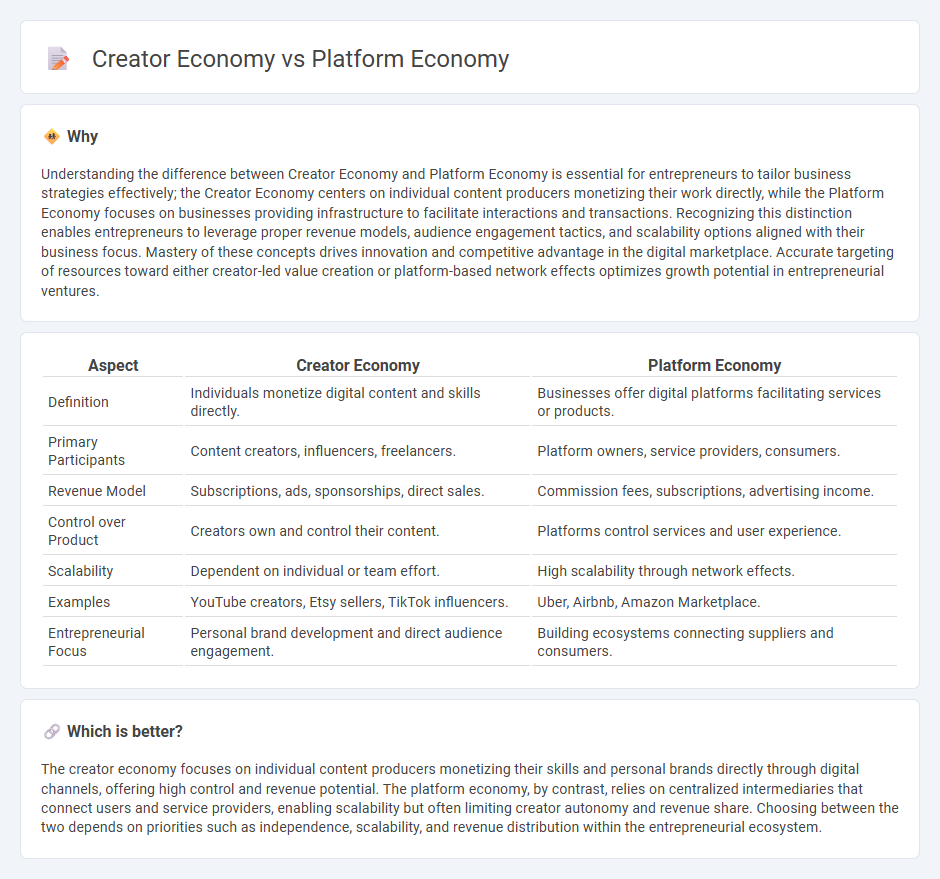
Entrepreneurship in the creator economy thrives on individual content production, monetization, and direct audience engagement, emphasizing personal brand development and niche market opportunities. In contrast, the platform economy centers on scalable ecosystems, where platforms facilitate interactions between users and providers, driving network effects and large-scale marketplace dynamics. Explore further to understand how these economic models reshape business strategies and entrepreneurial success.
Why it is important
Understanding the difference between Creator Economy and Platform Economy is essential for entrepreneurs to tailor business strategies effectively; the Creator Economy centers on individual content producers monetizing their work directly, while the Platform Economy focuses on businesses providing infrastructure to facilitate interactions and transactions. Recognizing this distinction enables entrepreneurs to leverage proper revenue models, audience engagement tactics, and scalability options aligned with their business focus. Mastery of these concepts drives innovation and competitive advantage in the digital marketplace. Accurate targeting of resources toward either creator-led value creation or platform-based network effects optimizes growth potential in entrepreneurial ventures.
Comparison Table
| Aspect | Creator Economy | Platform Economy |
|---|---|---|
| Definition | Individuals monetize digital content and skills directly. | Businesses offer digital platforms facilitating services or products. |
| Primary Participants | Content creators, influencers, freelancers. | Platform owners, service providers, consumers. |
| Revenue Model | Subscriptions, ads, sponsorships, direct sales. | Commission fees, subscriptions, advertising income. |
| Control over Product | Creators own and control their content. | Platforms control services and user experience. |
| Scalability | Dependent on individual or team effort. | High scalability through network effects. |
| Examples | YouTube creators, Etsy sellers, TikTok influencers. | Uber, Airbnb, Amazon Marketplace. |
| Entrepreneurial Focus | Personal brand development and direct audience engagement. | Building ecosystems connecting suppliers and consumers. |
Which is better?
The creator economy focuses on individual content producers monetizing their skills and personal brands directly through digital channels, offering high control and revenue potential. The platform economy, by contrast, relies on centralized intermediaries that connect users and service providers, enabling scalability but often limiting creator autonomy and revenue share. Choosing between the two depends on priorities such as independence, scalability, and revenue distribution within the entrepreneurial ecosystem.
Connection
The creator economy thrives on user-generated content and personal brands, which are facilitated by platform economy infrastructures such as social media, marketplaces, and subscription services. Platforms like YouTube, TikTok, and Patreon enable creators to monetize their work through direct payments, advertising revenue, and fan support, driving entrepreneurial opportunities. This symbiotic relationship fuels innovation, digital entrepreneurship, and new business models centered around content creation and community engagement.
Key Terms
Intermediation
The platform economy operates through centralized intermediation, connecting users and businesses via digital marketplaces that extract fees and control access. In contrast, the creator economy minimizes middlemen by empowering individual creators to directly monetize their audience using tools like Patreon and Substack. Explore how shifting intermediation models redefine economic value and user engagement.
Monetization
The platform economy primarily generates revenue through transaction fees, advertising, and data monetization on digital marketplaces such as Amazon, Uber, and Airbnb. In contrast, the creator economy emphasizes direct monetization strategies like subscriptions, merchandise sales, brand partnerships, and crowdfunding on platforms like Patreon, YouTube, and TikTok. Explore the evolving trends and monetization methods reshaping these economic models for deeper insights.
Ownership
The platform economy centers on centralized ownership where major corporations control data, infrastructure, and revenue streams, often limiting creators' independence. In contrast, the creator economy emphasizes individual ownership, enabling content creators to monetize their work directly through decentralized tools and personal branding. Explore how shifting ownership dynamics are redefining digital business models and empowering creators worldwide.
Source and External Links
Platform economy - Wikipedia - The platform economy refers to economic and social activities facilitated by digital platforms that connect different user groups, enabling interactions, collaboration, and transactions, with rapid growth impacting global business models and raising regulatory and social concerns.
Platform economy | EBSCO Research Starters - The platform economy involves digital marketplaces connecting suppliers and consumers, relying on technologies like algorithms and cloud computing to transform how goods and services are bought, sold, and innovated upon in the digital age.
The Rise of the Platform Economy - The platform economy is driven by the use of big data, cloud computing, and algorithms, creating multisided digital frameworks that reshape work, value creation, and global economic competition.
 dowidth.com
dowidth.com